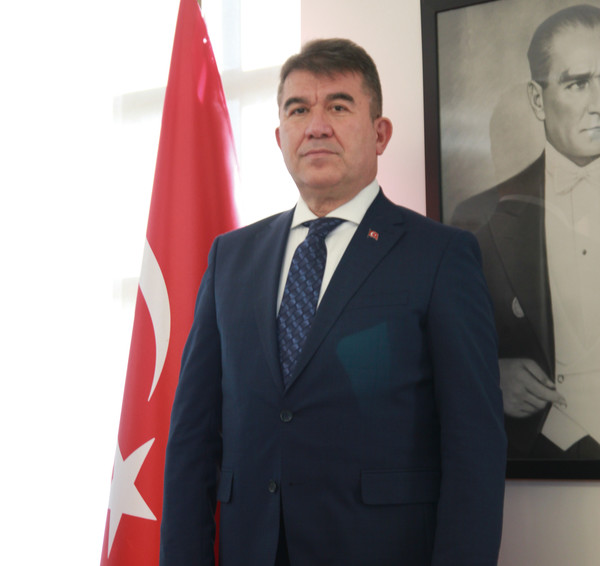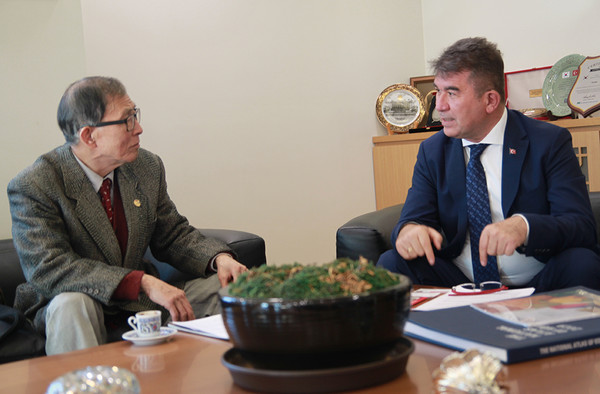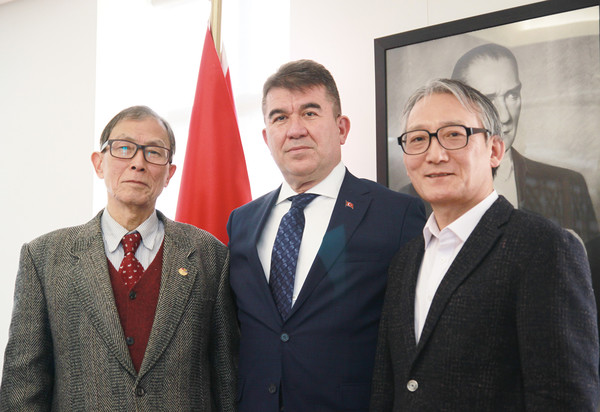
Turkey And Korea Have been enjoying long-lasting brotherhood and economic partnership. Turkey was the first country to send military troops to help Korea after the North attacked Korea in 1950. In commemoration of the 71st Anniversary of the Korean War, the 'SeoulCity' magazine interviewed H.E. Ersin Ericin, for its special report, Turkey-Korea Economic Ties in 2021' as below.
Q. Ambassador's message on Independence Day of Turkey.
On 29 October 2020, we celebrated the 97th anniversary of the proclamation of the Republic of Turkey with great excitement, as we do every year. Although this joyous event, was somewhat muted this year due to the COVID-19 restrictions, we all expressed, in a somber way, our gratitude to our timeless leader Mustafa Kemal Atatürk who, following the war of liberation proclaimed Turkey as a republic on 29 October 1923.
Democracy, rule of law, free market economy, individual rights and freedoms, pluralism, secularism and welfare state have since constituted the foundation of Turkey.
As a member of NATO and the Council of Europe, as well as a part of the European legal and security system, we are both the West and the East. Our Foreign policy goal of “Peace at Home, Peace in the World” reflect our vision of global peace and prosperity.
We are also proud to have cultivated close friendships all around the world, among which Korea has a special place. Our relations which date back many centuries have transformed into a blood brotherhood with the Korean War and were upgraded to a Strategic Partnership in 2012. We are determined to further advance these ties in all possible domains.
Q. Please introduce prevailing industry and unique products of Turkey.
Turkey exports its products to 220 countries and customs areas in total. One in four television sets and one in five kitchen appliances used in Europe are produced in Turkey. There is also an increasing share of Turkish products globally. Turkey holds a share of over 35% in woven carpet and over 20% in reinforcing bars in the world. The industrial products manufactured by Turkey, as the 10th largest exporter in the world, cover nearly 20 products from T-shirts to refrigerators, ceramics, buses, marble and home textile.
What do you think would be the most attractive sectors for Korean companies to invest in Turkey.
Turkey with its strong industrial infrastructure and services sector, has ample potential. Turkey is positioned as the country with the highest production power and efficiency in terms of capacity and technology in the region stretching from Italy to Beijing. As such Turkey is an ideal manufacturing base for medium and high-tech products in Eurasia.
Turkey has received more than 110 investments from Korean companies so far. However, we believe that there is much more to be done, therefore, invite more Korean companies to invest in Turkey especially in the areas of pharmaceuticals, biotechnology, robotics, AI, medicine, education, chemicals, cosmetics and energy.

Q. Please introduce investment environments of Turkey and special favors to foreign investors.
Turkey’s investment environment
The coronavirus pandemic has negatively affected all areas of life, including the economy. The world witnessed a decline in global trade and foreign direct investments (FDI) even prior to the outbreak, due to certain reasons such as uncertainty in trade policies, escalating protectionism, and falling profitability.
Meanwhile, the Turkish economy expanded by 6.7% in the third quarter of 2020. With this outcome, Turkey ranked first in the world and became the only OECD member country to post a positive growth during this period. Thus, Turkey currently stands out as one of the few economies that have been least affected by the global recession stemming from the novel coronavirus.
Turkey focuses on instruments that will alleviate the effects of the coronavirus pandemic, increase the resilience of our economy, generate more job opportunities, and boost production and efficiency.
Key reforms and legislative efforts have been put in place to improve Turkey's investment environment and increase direct investments needed for Turkey's sustainable development. Furthermore, incentives programs catering to the needs of investors have been devised to provide our country with high added-value investments that would integrate Turkey into the global value chain.
Currently, special incentives packages for technology-intensive investments, strategic investments, priority sectors and regional investments, particularly R&D incentives, are offered to investors. The Turkish Government has further launched a project-based incentives scheme for mega projects in strategic sectors.
Turkey made gradual progress in the World Bank’s Global Ease of Doing Business Index to climb from 84th place among 155 countries in 2006 to 33rd place among 190 countries as of 2020. Following such reforms and incentives, Turkey also has attracted a total FDI amount of more than USD 222 billion during the 2003-2020 period.
Turkey's global advantages
- Economic and political stability
- Predictability
- Investor-friendly legal framework
- Protection of intellectual and industrial rights
- Highly-qualified labor pool
- Large domestic market
- Proximity to foreign markets in the region
- Ease of exports
- Infrastructure investments in the past 18 years
- Competitive costs
- Robust and diverse supply chain
- A wide range of R&D incentives
Turkey’s strategic location offers easy access to 1.7 billion people within a 4-hour flight radius. More than 23 urban centers, each populated with more than one million citizens, support Turkey's thriving and large domestic market. With its 83 million population, half being younger than 32.4 years, Turkey has the largest youth population among EU member states. Our overall labor force is more than 30 million people, positioning us as the 3rd largest labor force in Europe.
Turkey’s investment legislation is simple and complies with international standards, while offering equal treatment for all investors. The Turkish government has set the target of increasing the share of R&D investments within the overall public budget to 2 percent.
What advantages does Turkey offer in terms of direct investors?
- Strong and diverse manufacturing capabilities
- Developed and tech-supported logistics infrastructure
- Proximity to source and destination markets
- Qualified and cost-competitive labor force
- Liberal investment climate with an extensive international trade networks
The immediate impact of the Covid-19 has been the disruption of global value chains and the sudden halt of economic activities across the world. Multinationals have either cancelled or postponed their investments across the world.
On the other hand, this has created new opportunities for companies and investment promotion agencies.
The disruption caused by the Covid19 has revealed the weak links in global supply chains. Therefore, multinationals are reconsidering their geographic and sectoral activities to diversify their supply networks.
Turkey has a diverse and a strong manufacturing base, and has indeed moved up the value chain over the past decades. The Turkish government supports manufacturing, especially high value-added activities by means of customized incentives and policies.
Logistics infrastructure has been key to Turkey’s participation in global value chains. Consequently, Turkey has massively invested in transport infrastructure over the past decade, establishing domestic and international transport links.
All of the above factors make Turkey an ideal location for multinational companies looking for diversification of their supply chains.
Turkish incentive schemes include tailored and complete packages for projects in manufacturing, services, and R&D and all investors regardless of being international or local are treated equally under the incentive laws and regulations.
Incentives are available in various sectors and scales and categorized under four groups; general, regional, strategic and project based. These may also be tailored for projects in priority sectors classified as key areas for the transfer of technology and economic development. In addition, the Turkish government provides generous support programs for R&D and innovation projects, employee training initiatives, and for exporters through various grants, incentives, and loans.
According to EY Attractiveness Survey Europe, Turkey became the 7th most popular Foreign Direct Investment (FDI) destination in Europe in 2018. Since 2002, Turkey has attracted around USD 210 billion of FDI with its favorable incentive systems. During the past 18 years, the finance and manufacturing sectors have attracted the highest amount of FDI in Turkey. The majority of FDI inflows to Turkey have originated from Europe, North America, and the Gulf countries, while Asia’s share has been noticeably on the rise.
Q. Please introduce several outstanding Korean companies’ activities in Turkey.
Since many years, Korean companies have been successfully operating in Turkey, which also provides vast possibilities to reach European, Middle Eastern, Causacus and African markets, thanks to its central geographical location, qualified and dynamic work force and strong infrastructure. As a matter of fact, the Hyundai Motor company, the world’s fourth biggest steel producer POSCO, automobile part producer Assan Hanil and the world’s biggest spandex producer Hyosung TNC have been manufacturing in Turkey, exporting their products to the aforementioned markets, allowing them to successfully increase their share in the global economy.
We also have a lot going on with Korea, in the infrastructure sector. A consortium of Limak Holding and Yapı Merkezi along with Korean companies Daelim and SK E&C have started building the longest suspension bridge in the world, set to open in 2023. We are looking forward to continuing our cooperation with Korean firms in such mega projects.

Tourism in Turkey.
Located at the crossroads of multiple regions, Turkey has been a cradle and bridge for many civilizations. It has inherited traditions and cultures of earlier civilizations, creating its unique character and contributing to the vast diversity of humanity.
Turkey is a modern country with a captivating blend of antiquity and contemporary and of East and West. It is one of the leading tourism destinations in the world, with stunning sceneries and a rich cultural and historic legacy. With its cosmopolitan cities, peaceful villages, natural wonders, beautiful coastlines and spectacular historical icons Turkey is easily one of the world's most fascinating destinations, hosting around 40 million tourists a year.
Istanbul, has a number of major attractions derived from its historical status as capital of the Byzantine and Ottoman Empires. These include the Sultan Ahmed Mosque (the "Blue Mosque"), Hagia Sophia, Topkapı and Dolmabahçe Palaces.
Mediterranean and the Aegean coastal areas are a must see for sea loving tourists. Major resort towns include Bodrum, Fethiye, Marmaris, Antalya, Kuşadası and Çeşme. Antalya is also a leading golfing resort with breathtakingly beautiful golf courses.
Other cultural attractions elsewhere in the country include the sites of Ephesus, Troy, Pergamon, Pamukkale, Hierapolis, Trabzon (where one of the oldest monasteries is the Sümela Monastery), Konya (where the poet Rumi had spent most of his life), Didyma, Church of Antioch, King rock tombs with its acropolis in Amasya, religious places in Mardin (such as Deyrülzafarân Monastery), and the ruined cities and landscapes of Cappadocia (where a series of geographical formations were used as dwellings by early Christian settlers. A balloon ride is a must to enjoy the spectacular scenery from above). Göbeklitepe in Şanlıurfa also should not be missed by those interested in the earliest manmade structures of the Monolithic period to date. Ankara as the capital of Turkey is also worth a visit. It is also host to Anıtkabir, the mausoleum of Atatürk, the founder of the Republic of Turkey and various historical museums.
Further strengthening economic and cultural relations:
Last year Turkey has announced a new initiative towards the Asian countries, which is quickly evolving into the World’s new economic gravitational center.
In the context of our new initiative, “Asia Anew”, our goal is to improve our relations and capture a brand new energy with all of Asia.
We are developing the necessary tools to comprehensively embrace Asia with the cooperation of public and private sector, university as well as civil society. This will encompass many areas including education, defense industry, investments, trade, technology, culture and political dialogue. We see Korea, our second largest trade partner in Asia (after China), as one of the strongest pillars in this policy.
With Korea, we are focusing on specific areas to further our cooperation. One such area is digital transformation. Both our countries are leading actors in this field and we have a lot to gain from cooperation.
We also intend to work more closely in the health sector from biotechnology and immunology to vaccine and protective gear production.
Another priority field is the defense industry, notably naval and air defense industries. We already have an intense cooperation in this field.
Construction has also been an important field of cooperation. Korean companies have already contributed to major infrastructure projects in Turkey. Turkish-Korean partnership will continue to put its mark to new megaprojects.
Direct flights between our countries also strengthen our people to people ties as well as the contacts between our business people.
Despite the pandemic, which has brought to a halt, most commercial and tourism activities, we observe a promising increase in investments of some major Korean companies in Turkey.
There is plenty of interest in Turkey about Korean culture, especially K-pop music and groups as well as TV dramas are very popular among youngsters in Turkey. There are many teenagers that are attending Korean language courses because of their growing interest towards Korea. Our students come to Korea to enroll in its world-renowned universities, in the meantime, building bonds of friendship that will last for a lifetime.
The Yunus Emre Institute, which is the first and only Turkish cultural institute in Korea that was established last year, within the Hankuk University of Foreign Studies is already making significant contributions to strengthening our cultural bonds.
I hope that, in the not very distant future, our readers will get to visit Turkey to experience its unrivalled natural beauty as well as its cultural and historical heritage, and as a result, contribute further to the strengthening of the awareness and brotherhood between our nations.

